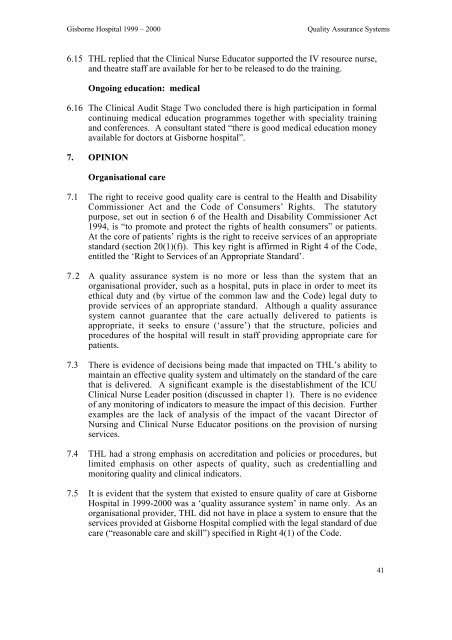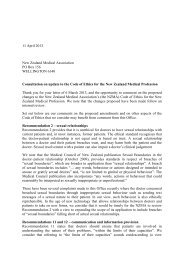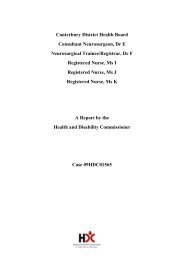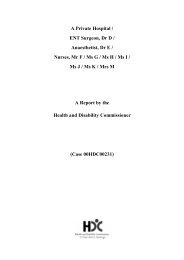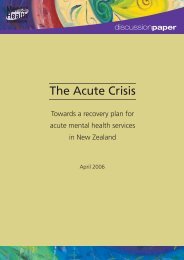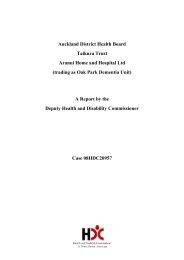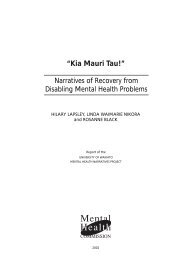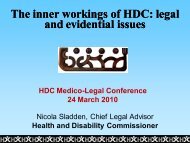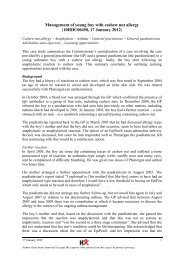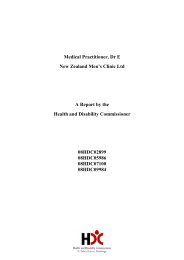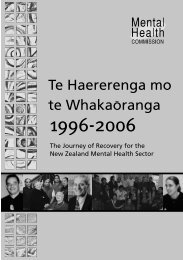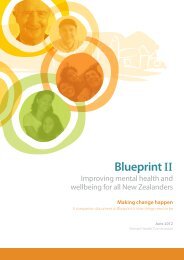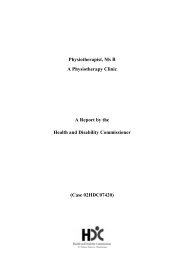Gisborne Hospital Report - Health and Disability Commissioner
Gisborne Hospital Report - Health and Disability Commissioner
Gisborne Hospital Report - Health and Disability Commissioner
Create successful ePaper yourself
Turn your PDF publications into a flip-book with our unique Google optimized e-Paper software.
<strong>Gisborne</strong> <strong>Hospital</strong> 1999 – 2000<br />
Quality Assurance Systems<br />
6.15 THL replied that the Clinical Nurse Educator supported the IV resource nurse,<br />
<strong>and</strong> theatre staff are available for her to be released to do the training.<br />
Ongoing education: medical<br />
6.16 The Clinical Audit Stage Two concluded there is high participation in formal<br />
continuing medical education programmes together with speciality training<br />
<strong>and</strong> conferences. A consultant stated “there is good medical education money<br />
available for doctors at <strong>Gisborne</strong> hospital”.<br />
7. OPINION<br />
Organisational care<br />
7.1 The right to receive good quality care is central to the <strong>Health</strong> <strong>and</strong> <strong>Disability</strong><br />
<strong>Commissioner</strong> Act <strong>and</strong> the Code of Consumers’ Rights. The statutory<br />
purpose, set out in section 6 of the <strong>Health</strong> <strong>and</strong> <strong>Disability</strong> <strong>Commissioner</strong> Act<br />
1994, is “to promote <strong>and</strong> protect the rights of health consumers” or patients.<br />
At the core of patients’ rights is the right to receive services of an appropriate<br />
st<strong>and</strong>ard (section 20(1)(f)). This key right is affirmed in Right 4 of the Code,<br />
entitled the ‘Right to Services of an Appropriate St<strong>and</strong>ard’.<br />
7.2 A quality assurance system is no more or less than the system that an<br />
organisational provider, such as a hospital, puts in place in order to meet its<br />
ethical duty <strong>and</strong> (by virtue of the common law <strong>and</strong> the Code) legal duty to<br />
provide services of an appropriate st<strong>and</strong>ard. Although a quality assurance<br />
system cannot guarantee that the care actually delivered to patients is<br />
appropriate, it seeks to ensure (‘assure’) that the structure, policies <strong>and</strong><br />
procedures of the hospital will result in staff providing appropriate care for<br />
patients.<br />
7.3 There is evidence of decisions being made that impacted on THL’s ability to<br />
maintain an effective quality system <strong>and</strong> ultimately on the st<strong>and</strong>ard of the care<br />
that is delivered. A significant example is the disestablishment of the ICU<br />
Clinical Nurse Leader position (discussed in chapter 1). There is no evidence<br />
of any monitoring of indicators to measure the impact of this decision. Further<br />
examples are the lack of analysis of the impact of the vacant Director of<br />
Nursing <strong>and</strong> Clinical Nurse Educator positions on the provision of nursing<br />
services.<br />
7.4 THL had a strong emphasis on accreditation <strong>and</strong> policies or procedures, but<br />
limited emphasis on other aspects of quality, such as credentialling <strong>and</strong><br />
monitoring quality <strong>and</strong> clinical indicators.<br />
7.5 It is evident that the system that existed to ensure quality of care at <strong>Gisborne</strong><br />
<strong>Hospital</strong> in 1999-2000 was a ‘quality assurance system’ in name only. As an<br />
organisational provider, THL did not have in place a system to ensure that the<br />
services provided at <strong>Gisborne</strong> <strong>Hospital</strong> complied with the legal st<strong>and</strong>ard of due<br />
care (“reasonable care <strong>and</strong> skill”) specified in Right 4(1) of the Code.<br />
41


